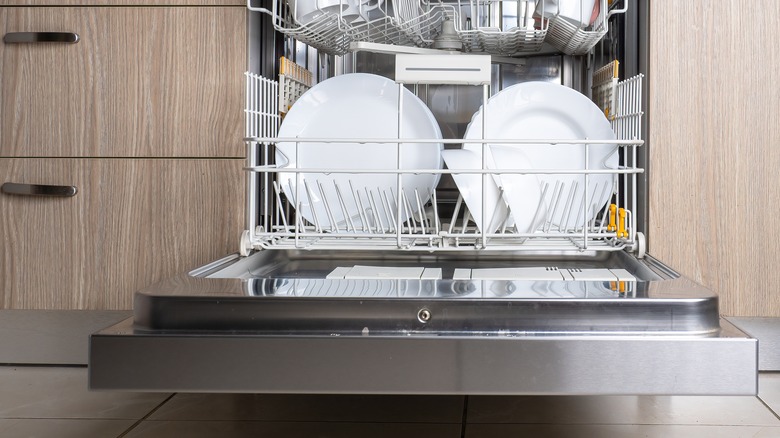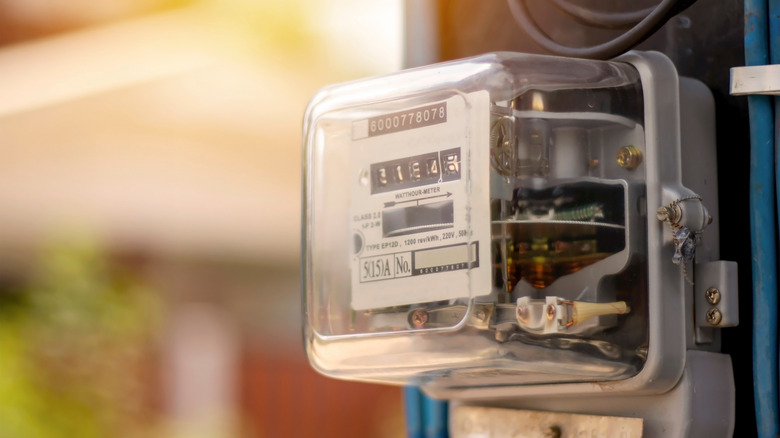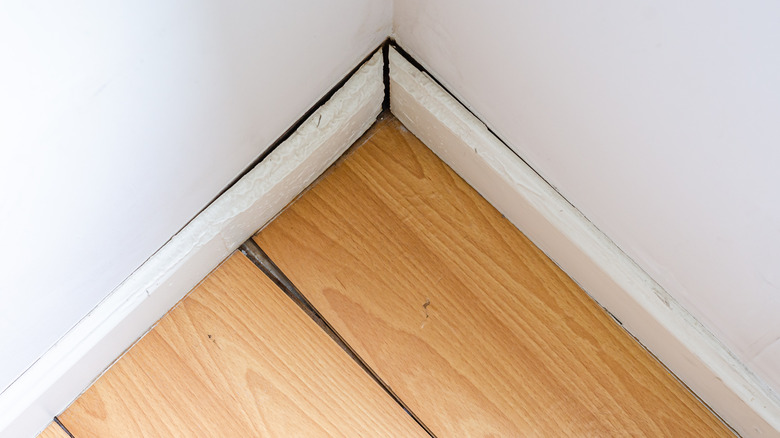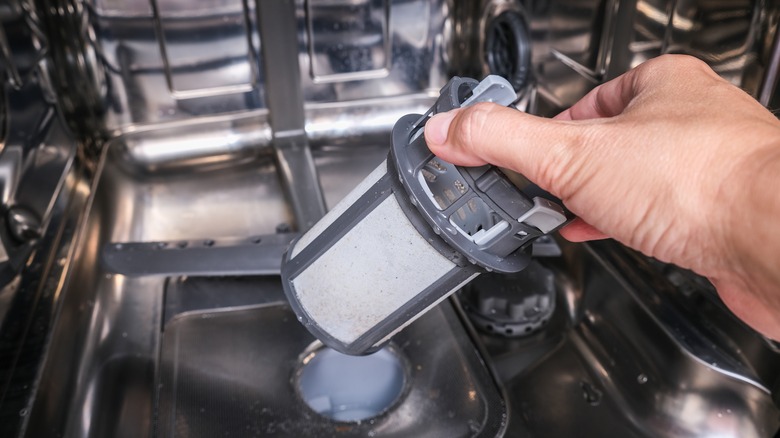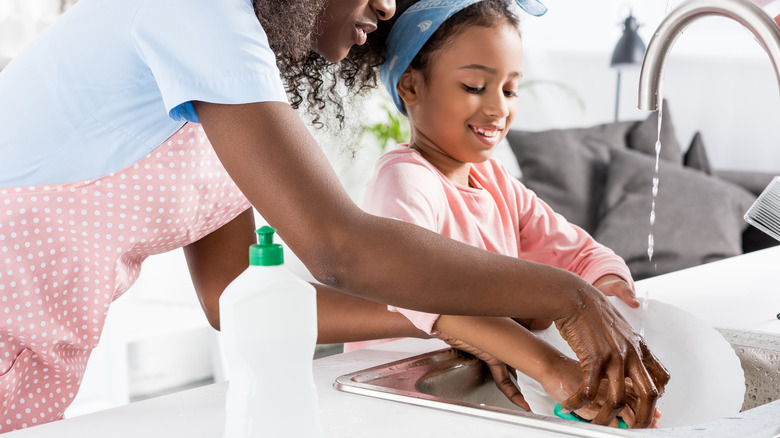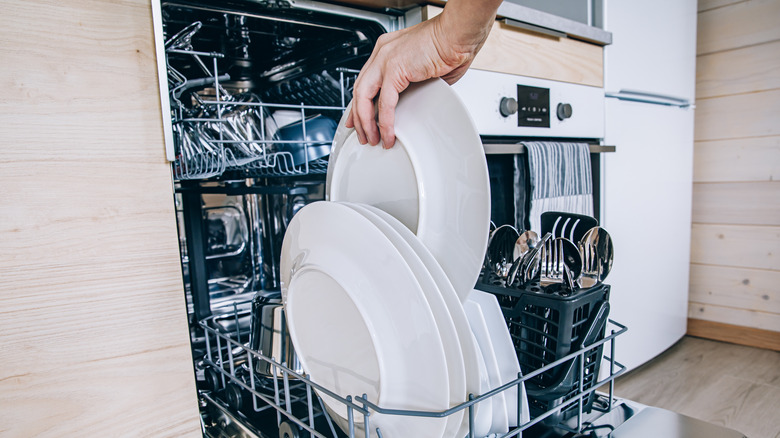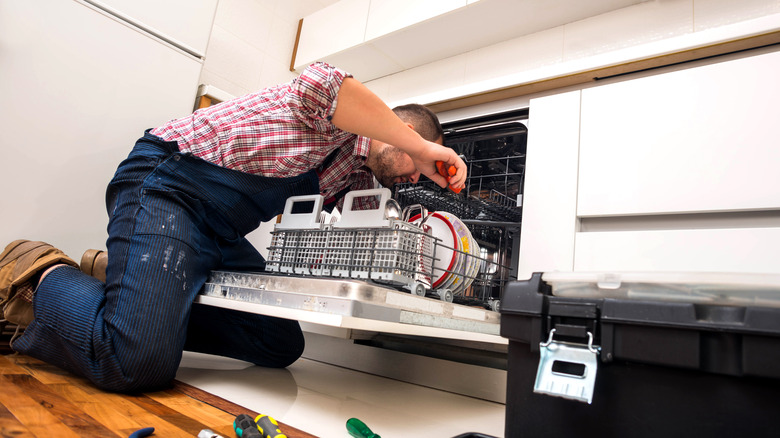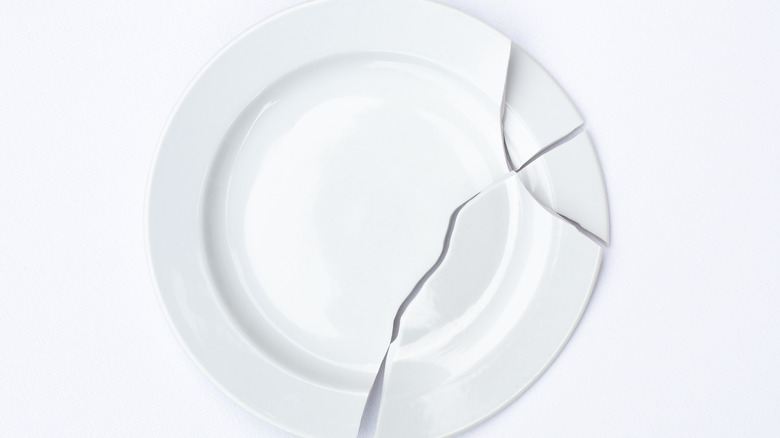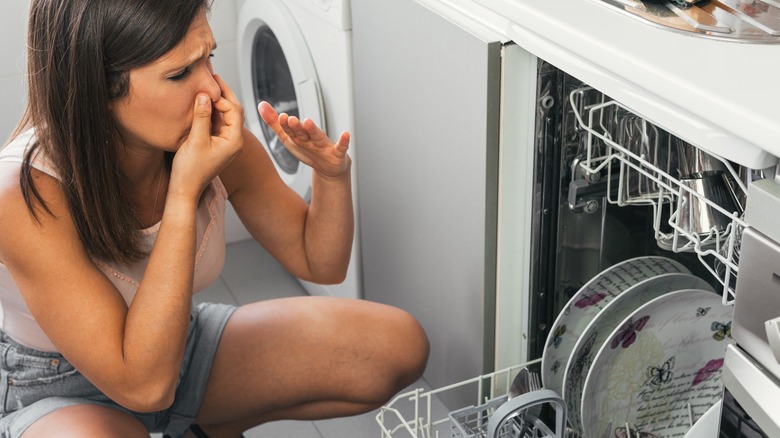The Cons To Dishwashers That You Never Knew About
Look, we've all done it. We cooked a delicious meal that took us longer than expected, threw the dirty dishes in the sink, and said to ourselves, "I'll clean those after I eat." Then the time comes, and the last thing in the world you want to do is clean all the dishes you dirtied up because you just had to try out that new recipe you found online. And believe us, we understand that dishwashers can be lifesavers when it comes to convenience and saving time, but don't be fooled. There are also some downsides to owning this household appliance that many overlook.
Is it in your budget? Do you need to make modifications to your kitchen to accommodate this new appliance? Do you even have space for one? If you're thinking of adding a dishwasher to your kitchen, keep reading to learn more about the beloved appliance's hidden downsides.
They can consume a great deal of energy
Dishwashers run on electricity, and Appliance Repair Sub-Zero reports that dishwashers are the second most energy-intensive output in a household, coming in second to your HVAC. The appliance uses the energy to clean a load of dishes as a TV turned on for 20 hours! One of the most common causes of high electricity bills is keeping household appliances plugged in even when not used. This means that all these appliances are idling — using energy even though they're inactive.
The Natural Resources Defense Council (NRDC) mentions that the energy used by idled appliances totals an average of $19 billion a year. If we were to break that down further, it would average $165 per U.S. household. All that idled energy adds up quickly, totanearlyse to 25,000 megawatts, which is 50 large power plants' worth of electricity!
Even though running your dishwasher only costs around $0.17 per cycle, it will inevitably eat away at your energy bill since it's a bigger appliance that isn't easy or practical to unplug on a regular basis. However, you can unplug smaller appliances like toasters, coffee makers, and blenders when not in use to help lower that electric bill and save you some more money each month. Another thing to look for are dishwashers that are Energy Star Certified — meaning the appliance is energy efficient and will clean your dishes without using excess amounts of energy and water.
They can be expensive
It's no secret that dishwashers aren't cheap, but did you know they can reach up to $2,000 depending on the features you desire? And that's not including installation and maintenance over the years. According to Forbes, professionals can charge anywhere from $100 to $450 for a basic installation with a pre-existing infrastructure, meaning there is already a foundation to connect the dishwasher easily. However, costs can begin at around $500 for a completely new installation.
The price of your dishwasher will also vary depending on the type of dishwasher you buy. There are typically four categories that dishwashers fall under: built-in, drawer, countertop, and portable. HomeAdvisor helps break down the four types of dishwashers and their costs. The countertop and portable dishwasher will be the cheaper options since neither requires plumbing installation. The built-in dishwasher is the most popular and what most people look for. The drawer dishwasher will be your most expensive due to its two-drawer system and its uncanny ability to blend into your cabinetry.
Now, if you're the type to go big or go home, you might want to add some luxurious upgrades. Some of these can include hidden control panels, reduced noise, multiple wash options, sanitization, specialized jets, and more. All these features can add up quickly, and while they aren't necessities, if you're looking for a dishwasher with all the bells and whistles, it might come at an extra cost.
They can cause water damage
According to Water Extraction Experts, roughly 30% of household floods and water damage are caused by appliance failure. Dishwashers are connected to our water supply, and because of this, our homes are exposed to a greater risk of water damage, reports Homeowners Insurance Cover. If left untreated, water damage can quickly lead to mold, warping, and mildew. Not to mention the cost of repair. For example, iPropertyManagement reports that a minor plumbing or fixture leak could cost around $100, whereas a malfunctioning appliance can cost up to $1,600. Depending on how bad the leak is and how quickly the damage spreads, your bills could skyrocket fast.
Not only can water damage eat into your savings, but it can also cause serious health concerns as well. Mold and mildew can sprout and produce harmful allergens and toxic substances. Injuries are also likely to occur due to falls on slippery surfaces. In extreme instances, electrocution can occur. Because of this, it's important to consistently check for and quickly manage water damage, as it can lead to multiple harmful avenues.
Thankfully, there are a couple of preventative measures to take to avoid water damage and astronomical cleanup prices. Replacing the rubber hose with a sturdier material — such as a steel-braided hose — and not running the dishwasher while you aren't home are great places to start.
It's one more appliance to clean
Adding a dishwasher to your kitchen will keep your dishes clean, but what about the dishwasher itself? Just like other appliances, the dishwasher also needs to be cleaned. We refresh the fridge, scrape the grill, wipe down the microwave, spray the oven, and scrub down the stove. So why would our dishwasher be any different?
The Cleaning Institute recommends periodically cleaning your dishwasher one to three times a year. However, depending on how often you use your dishwasher, cleaning it once a month or every few months might be better for long-time use and help get rid of that nasty build-up. In addition to periodical cleaning, a deep clean once a year is also important in maintaining the longevity and cleanliness of your dishwasher. Food and soap residue can quickly build up, clog the drain, and greatly reduce the cleanliness of your dishes.
There are a couple of ways you can clean your dishwasher, and Whirlpool has all the answers. One way is using the classics: vinegar and baking soda. We're convinced this duo can do it all. Remove the filter from the appliance and wash it separately in the sink. Then, pour 2 cups of vinegar into a dishwasher-safe glass, and run a heat-dry cycle. Once that's done, sprinkle baking soda on the bottom of the appliance, and run a second cycle.
Detergent companies have also made cleaning your dishwasher easy if the vinegar and baking soda method isn't your speed. Most cleaning companies sell cleansing tablets/pods you can use the same as dish detergent. It's as easy as pressing the start button!
Hand washing dishes can reduce stress
While using your dishwasher might be more convenient and less hassle, a study published by Florida State University suggests that handwashing dishes mindfully can potentially reduce stress. The researchers of the study found that of the 51 total participants, those who washed dishes mindfully felt increased feelings of inspiration by 25% and simultaneously lowered their anxiety by close to 30%. You're probably thinking, "what is mindfully washing dishes?" According to the researchers, it's taking in your surroundings and noticing the smaller acts of handwashing dishes like the aroma of the lemon-scented dish soap, the feel of the warm water as it splashes on your hands, and even the physical act of touching the dishware and watching it transform from stained to spotless.
Now, will mindfully washing your dishes cure all your problems? We wouldn't bet on it. However, taking some time each day to breathe in soothing smells and soak your hands in hot water might help you relax and even take your mind off your busy schedule. You can even add some essential oils to the drain and soak a warm towel in the dish soap to help cleanse off those dirty dishes. This is certainly one way to have your "me-time" while completing tasks.
Household chores can help teach responsibility
One of the downsides to dishwashers is that they don't offer the same lessons and benefits as hand washing dishes themselves. If you've ever uttered "back in my day, " this point might be for you. Graceful Oaks Ranch firmly believes that chores can help kids become more independent and self-sufficient in the future by allowing them to handle more responsibility and focus on their time-management skills gradually. Assigning small tasks around the house can also instill a feeling of trust and help build life skills that will carry into other aspects of their life. Doing some of the chores with your children can also help them understand teamwork and give you some quality time that you may otherwise miss.
Not only can kids learn valuable time management skills and become more independent, but they will also receive feelings of pride and accomplishment from completing goals. If you want to start implementing valuable life skills to those in your household, hand washing dishes might just be a good start.
They take up space
You have the money. You have the need. But do you have the space? While dishwashers aren't usually the biggest appliance in your kitchen, they still require a great deal of room. So, before you buy, ensure you have the extra space in your kitchen and, more importantly, the exact dimensions!
Having space and having enough space are two completely different things. Make sure there is enough room to fit your desired dishwasher. Thankfully, most appliance companies stick to a fixed set of dimensions. However, if you have a big household and need something bigger for everyday use, jot down the measurements you need carefully because a dishwasher that won't fit won't work. Aztec Appliance suggests being mindful of the exterior features of your dishwasher, such as handles or display buttons, as they can sometimes protrude beyond the length of your countertop. In the event your dimensions vary, always rely on the smaller dimensions for your space.
Upgraded Home reports that most standard dishwashers will come with measurements of 24 inches x 24 inches x 32 inches (length x width x height), whereas larger dishwashers can measure from 30 inches to 42 inches in length and width. In addition, a compact dishwasher such as a countertop or portable dishwasher can come in sizes of 18 to 22 inches. Just keep in mind that these are the standard sizes and that measuring your space before buying is always a safe idea.
They have the potential to break
Just like any other appliance, dishwashers can break. However, according to Durability Matters, the average dishwasher can last anywhere from 10 to 15 years if kept up with. Of course, this depends on how often you use the dishwasher, the quality of the appliance itself, and how well you maintain it over time.
So, what are some of the causes of a broken dishwasher, and how can we prevent them? According to Mr. Appliance, there are a few common reasons why some dishwashers might break. One of the ways it can break is by loading it incorrectly or simply overloading it. It's important to thoroughly rinse off your dishes before placing them in the dishwasher for a deep clean. Built-up debris from food can cause your pipes to clog and ultimately lead to a leak or burst in the hose. Similarly, you don't want to overload your dishwasher. Too many dishes stacked up can cause them to potentially fall and cause damage to the appliance. Much like your favorite amusement park ride, we want all dishes to remain in the dishwasher, fastened securely for a safe wash cycle.
Another cause of a broken dishwasher is the use of the wrong detergent. The wrong type of soap can cause your dishwasher to overflow. Think of Bobby from "The Brady Bunch" doing laundry ... the same thing can happen to your dishwasher. That's one mess your dishwasher can't clean.
They can ruin dishes
Nothing is worse than putting your favorite cup or plate in the dishwasher just to read the fine print later that says, "not dishwasher safe." Over time, it's easy just to throw whatever dishes you have in the dishwasher without thinking twice about it. But once you've ruined too many glasses, you'll start picking up on what is and isn't dishwasher safe.
So, what are some materials that are dishwasher safe? According to Everything Better, most stainless steel, glass, and ceramic dishware items are safe to place in your dishwasher. They're generally strong enough to handle the force and heat of the water. However, there are always exceptions to the rule. For example, while glassware is okay to put in the dishwasher, you might want to avoid placing expensive or fine-dining wine glasses in the wash as they're more fragile and prone to breaking. And while ceramics are generally safe, some ceramic coatings can be pretty delicate and potentially flake off, ruining your dish and your dishwasher. So, checking the packaging before making the first wash is always a good idea.
On the flip side, some materials to steer clear of when using your dishwasher are fine china, clay, certain plastics, wood, nonstick, and non-enameled cast iron. These are the items you want to hand wash only. Not only could you ruin an expensive piece of dishware, but you could also seriously damage your dishwasher in the process.
They can cause mold
Without the proper care, mold can quickly form inside your dishwasher and spark some serious health concerns. It's no secret that over time, food particles begin to build up and get stuck in hidden crevices throughout your dishwasher. But because of this, Bust Mold states that it's the perfect environment for mold to grow due to its moist and dark conditions.
However, if you notice the warning signs early enough, you might be able to catch it in time. There are a few signs to look for if you believe your dishwasher might be producing mold. To put it bluntly, mildew doesn't smell good, so if you notice a funky smell, it might be time to check if it's just leftover food particles or something more serious. Leaving a generous amount of time between each cycle might cause bacteria to sit and fester, even showing up on your dishes or racks. However, mold doesn't always show up in such obvious ways. Mold likes dark, secluded environments, and your drain hose or vent might be the perfect place to nest. Similarly, mold behind your dishwasher can spread and contaminate different aspects of your home. However, if you're taking care of your dishwasher, regularly cleaning it, and doing routine inspection checks, you should be safe from harmful bacteria.
While there's nothing quite as enjoyable as throwing your dirty dishes into the dishwasher, popping in a detergent pod, and pressing "start," there are also some downsides to consider before making such a big purchase. It's important first to weigh all your options and decide if a dishwasher is the way to go. You may find you enjoy washing dishes by hand. Sometimes the old saying goes: "If it ain't broke, don't fix it!" Unless it's your dishwasher, then by all means, please ... fix it. So, while there are some downsides to the beloved dishwasher, it's up to you to decide if they're worth the risk.
